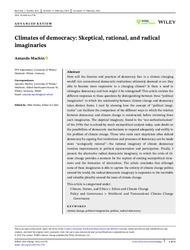Climates of democracy: Skeptical, rational, and radical imaginaries
DOI: https://doi.org/10.1002/wcc.774
Persistent URL: http://resolver.sub.uni-goettingen.de/purl?gldocs-11858/10241
Persistent URL: http://resolver.sub.uni-goettingen.de/purl?gldocs-11858/10241
Machin, Amanda, 2022: Climates of democracy: Skeptical, rational, and radical imaginaries. In: Wiley Interdisciplinary Reviews: Climate Change, Band 13, 4, DOI: 10.1002/wcc.774.
 |
Dokument öffnen: |
How will the theories and practices of democracy fare in a climate changing world? Are conventional democratic institutions ultimately doomed or are they able to become more responsive to a changing climate? Is there a need to reimagine democracy and how might it be reimagined? This article reviews the different responses to these questions by distinguishing between three “political imaginaries” in which the relationship between climate change and democracy takes distinct forms. I start by showing how the concept of “political imaginaries” can facilitate the comparison of the different ways in which the relation between democracy and climate change is constructed, before reviewing three such imaginaries. The skeptical imaginary, found in the “eco‐authoritarianism” of the 1970s that is echoed by much sociopolitical analysis today, casts doubt on the possibilities of democratic mechanisms to respond adequately and swiftly to the problem of climate change. Those who resist such skepticism often defend democracy by arguing that institutions and processes of democracy can be made more “ecologically rational”—the rational imaginary of climate democracy involves improvements in political representation and participation. Finally, I present the alternative radical democratic imaginary, in which the crisis of climate change provides a moment for the rupture of existing sociopolitical structures and the formation of alternatives. The article concludes that although none of these imaginaries is able to capture the entirety of climate change politics around the world, the radical democratic imaginary is responsive to the inevitable and valuable plurality around the issue of climate change.
This article is categorized under:
Climate, Nature, and Ethics > Ethics and Climate Change
Policy and Governance > Multilevel and Transnational Climate Change Governance Climate protests may mobilise new political subjects.
Statistik:
ZugriffsstatistikSammlung:
- Geographie, Hydrologie [454]
This is an open access article under the terms of the Creative Commons Attribution‐NonCommercial‐NoDerivs License, which permits use and distribution in any medium, provided the original work is properly cited, the use is non‐commercial and no modifications or adaptations are made.

